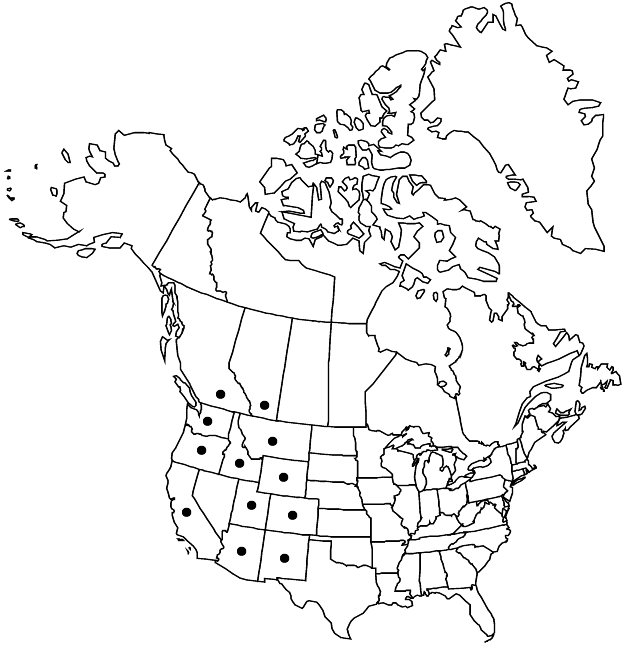Silene scouleri
Fl. Bor.-Amer. 1: 88. 1830.
Plants perennial; taproot stout; caudex branched, woody, crowns 1–several. Stems erect, simple proximal to inflorescence, slender or stout, 10–80 cm, puberulent. Leaves 2 per node; basal petiolate, blade oblanceolate, 6–25 cm × 4–30 mm, retrorsely puberulent on both surfaces; cauline in 1–12 pairs, usually sessile, blade well developed, lanceolate to ovate-lanceolate, oblanceolate, or rarely linear or linear-lanceolate. Inflorescences cymose, pseudo-racemose, or rarely paniculate, erect or nodding, with 1–12 flowering nodes, 2–20-flowered, open or dense, flowers paired or in many-flowered whorls, bracteate, cymes often sessile; bracts 3–60 mm. Pedicels becoming deflexed at base of calyx, 1/4–2 times calyx, glandular-pubescent. Flowers shortly pedicellate or sessile; calyx prominently 10-veined, campanulate or tubular in flower, clavate, turbinate, or fusiform in fruit, constricted or not at base around carpophore in fruit, 8–20 × 3–8 mm, veins parallel, purplish or green, with pale commissures; lobes lanceolate, 2–5 mm, apex obtuse with broad membranous margin and tip; corolla white, greenish white, or pink, sometimes tinged pink or purple, clawed, claw longer than calyx, limb deeply 2–4-lobed, often with smaller lateral teeth, 2.5–8 mm, appendages 1–3 mm; stamens ± equaling corolla claw; styles 3–4, ± equaling corolla claw. Capsules ovoid to ellipsoid, equaling or slightly longer than calyx, opening by 6 or 8 teeth; carpophore 1.5–6 mm. Seeds brown or grayish brown, reniform, 1–1.5 mm, margins papillate, rugose on sides.
Distribution

Alta., B.C., Ariz., Calif., Colo., Idaho, Mont., N.Mex., Oreg., Utah, Wash., Wyo., Mexico.
Discussion
Subspecies 3 (3 in the flora).
Silene scouleri is a very complex species that appears to be in the process of diverging into at least three different entities. Subspecies scouleri is a plant of the Pacific coast and lowlands. It has tall, stiffly erect stems, lanceolate to broadly lanceolate leaves, and a viscid inflorescence with many-flowered whorls of almost sessile flowers ranging in color from greenish white to rich pink. At the other extreme is subsp. pringlei, a plant of the mountains in Mexico extending northwards into Arizona and New Mexico. It has slender, somewhat nodding flowering stems with very narrow leaves. The flowers are usually paired at each node and secund on slender pedicels about equaling the calyx in length. The petals are off-white, sometimes tinged with dusky purple. Between the two extremes is subsp. hallii, a short, stocky plant of the Rocky Mountains and foothills with a few-flowered inflorescence. It has a larger, campanulate calyx, and some of the flowers usually become deflexed. Differentiation among these three forms is incomplete and plants indeterminate to subspecies are frequently encountered in areas away from the main distribution centers of the three subspecies. In northern Oregon and Idaho there appear to be populations connecting S. scouleri with S. oregana. They have some of the characteristics of S. oregana but not its laciniate petals. They may represent a more luxuriant form growing in taller vegetation, but their status needs further study.
Selected References
None.
Lower Taxa
Key
| 1 | Calyces campanulate, not or only slightly clavate in fruit, 13-18(-20) × (5-)6-8 mm; inflorescences with (1-)3-6(-8) flowering nodes; plants 10-40cm; pedicels stout | Silene scouleri subsp. hallii |
| 1 | Calyces tubular to narrowly clavate in flower, clavate, turbinate, or fusiform in fruit, (8-)10-16 × 3.5-7 mm; inflorescences with 3-12 flowering nodes; plants 20-80 cm; pedicels slender | > 2 |
| 2 | Inflorescences erect, flowers in dense pseudowhorls of usually sessile, (2-)5-20-flowered cymes, both sessile and pedicellate flowers in each cyme; pedicels erect | Silene scouleri subsp. scouleri |
| 2 | Inflorescences nodding, flowers usually paired at each node, all pedicellate; pedicels ± equaling calyx, often sharply deflexed at baseof calyx | Silene scouleri subsp. pringlei |